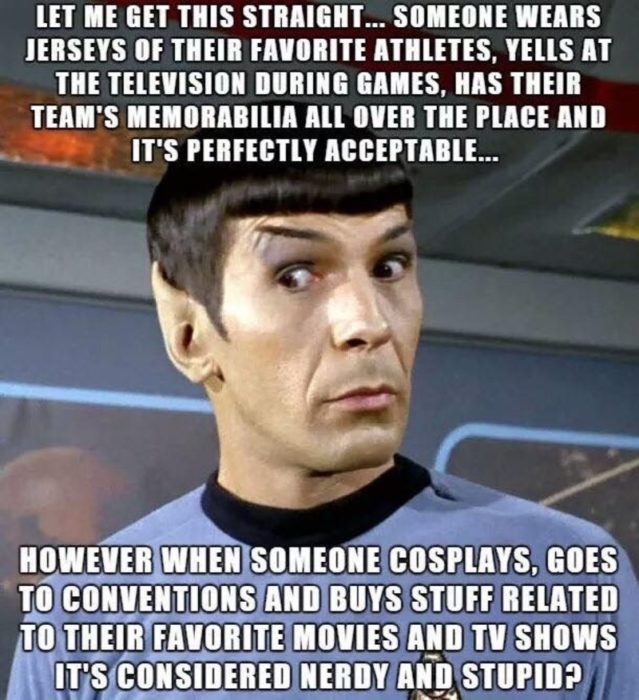Are All Fandoms Created Equal?
There is a particular meme that always shows up twice during the year. You can see the meme below, where Spock is pondering the logical fallacy of looking down on sci-fi/fantasy conventions and cosplay while bearing less ill will to the equally silly/awesome/childish/dedicated/what-have-you devotion of football fans to their respective teams. This meme always makes the rounds when football season kicks off in late August and shows up again during the NFL playoffs, intensifying right around the Super Bowl. This is obviously a sore subject for many people on both sides, but since I’m not firmly rooted in either one, I’ll just throw my two cents out there.
I don’t consider myself an “avid” fan of anything. There are some fictional realms that I really enjoy, as well as some sports that I watch regularly. Yet I’ve never been to a convention and I don’t own any figurines, comics, or collectibles. I did see all three LOTR movies on opening night and numerous times afterwards (the movie tallying scene in Clerks 2 was a hoot) and I know a fair amount about Star Trek, though I can’t say that Star Wars holds my attention for long. I’ve been to a number of sports games but I have never been to a professional football game, and although I am a long-suffering fan of my hometown Atlanta Falcons, I don’t own any memorabilia or jerseys. I do watch football whenever it is on TV and I’ve been getting embarrassed in my neighborhood fantasy football league for a couple of years now. I know a good bit about the game, as well as baseball and basketball. However, I don’t live for these sports, just as I don’t “geek out” whenever a new Star Wars or Harry Potterverse movie trailer drops.
 So now you know my (lack of) geek or sports cred, let’s examine the meme at hand. First, are these two fandoms anything alike? What do they share in common? Well, the fans spend exorbitant amounts of money on all manner of entertainment and merchandise related to their particular fandom. They wear uniforms to identify with their tribes. People who “don’t get it” think they’re weird. Their significant others are tired of competing against the fandom for affection. And no matter what you say or do or think, you’ll never convince them that your fandom is better than theirs.
So now you know my (lack of) geek or sports cred, let’s examine the meme at hand. First, are these two fandoms anything alike? What do they share in common? Well, the fans spend exorbitant amounts of money on all manner of entertainment and merchandise related to their particular fandom. They wear uniforms to identify with their tribes. People who “don’t get it” think they’re weird. Their significant others are tired of competing against the fandom for affection. And no matter what you say or do or think, you’ll never convince them that your fandom is better than theirs.
How are sports and scifi/fantasy fandoms different? I suppose the biggest difference would be that one is based in reality while another is not. I don’t mean this to be derogatory, but this is a simple fact. Everything that sports fans idolize and cheer for are done by real people in the real world. Their “superheroes” don’t save the world or stop evil villains (at least, not in the traditional sense) but they fight against physics, physiology, psychology, age, the environment, and most importantly, other people who are very similar to them and who want the same thing. Fictional fandoms are based entirely on imaginary people, creatures, and worlds, and while they may be as complicated or perhaps even more so than our reality, there are far less limits in these realms.
This is where I have to disagree with Mr. Spock. If you ask a sports fan why he or she is wearing the jersey of their favorite player and the fan responded, “Because he is so AWESOME! He can jump over mountains and lift three tons and run a forty in two seconds and he never needs to sleep and he eats twenty steaks a day!”, people would probably back away slowly. Yet these characteristics would not be out of place at all at a superhero convention where people dress up as Superman or the Flash or Captain Marvel. Now, wearing a jersey or a costume imparts no powers nor brings the wearer any closer to their idol, but there is something to be said for idolizing reality rather than fantasy. You CAN meet your real-life sports hero. You CAN directly benefit from their community charity. You CAN possibly even play with or against them someday. However, the closest we’ll ever get to meeting a real-life superhero is shaking hands with the actor or actress who portrays them on screen.
Yet this speaks to the power of imagination. Superman isn’t a real person, but the idea of Superman has inspired millions and has helped many people through difficult times, as well as spawned countless livelihoods. Removing Spider-Man from the world would leave a bigger hole than if Tom Brady was suddenly erased (did I say that out loud?). So while cosplay and fantasy conventions are certainly more “nerdy” than sports, they are no more and no less stupid. It’s all what we make of it.






































I don’t really care about sports, so… :p
At the heart of this, though, people seem to be bothered by the hypocrisy of this issue: ‘What do you mean I can’t decorate my room with anime stuff and talk about my favorite shows incessantly? You do that with your sports stuff all the time and I don’t bother you about it!’
I tend to agree. I’m avoidant of conversations surrounding sports, and won’t sit down to watch a football game, but I’m glad that other people have a relatively harmless thing that makes them happy. I hope others will extend the same courtesy toward my beliefs and interests.
Still, there are time, place and manner aspects of this. If someone has friends that don’t like sports, for instance, it’s pretty rude to only discuss sports with them. I know that when I first started college I made sure not to go on and on about anime and other story stuff too much because I knew a lot of people would find that annoying. I tend to be on the calm and reserved side, actually, so some people were actually surprised to hear I liked anime. Mainly since, to them, I probably seem too serious and withdrawn to fit their stereotype of crazy otaku.
There are times to get excited about our interests, especially when around like minded people, but it’s also not bad to practice a sense of…dignity, when it comes to this stuff. There are lots of times when people need to shut things off and be serious. There’s nothing wrong with our little obsessions, but it’s important to show that we can turn them off, control them, and have a multitude of interests outside those obsessions.